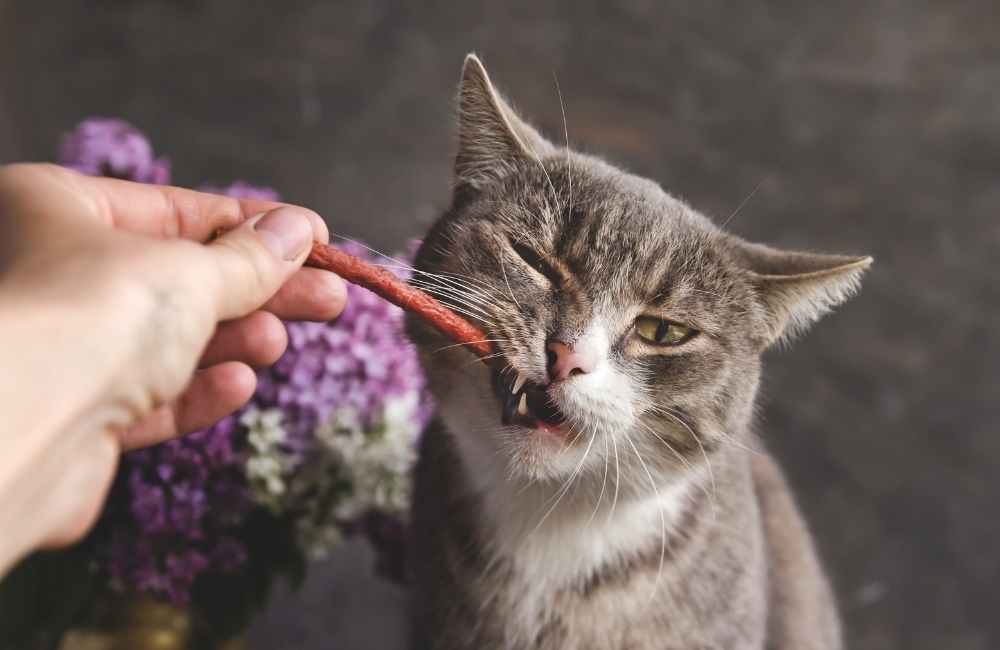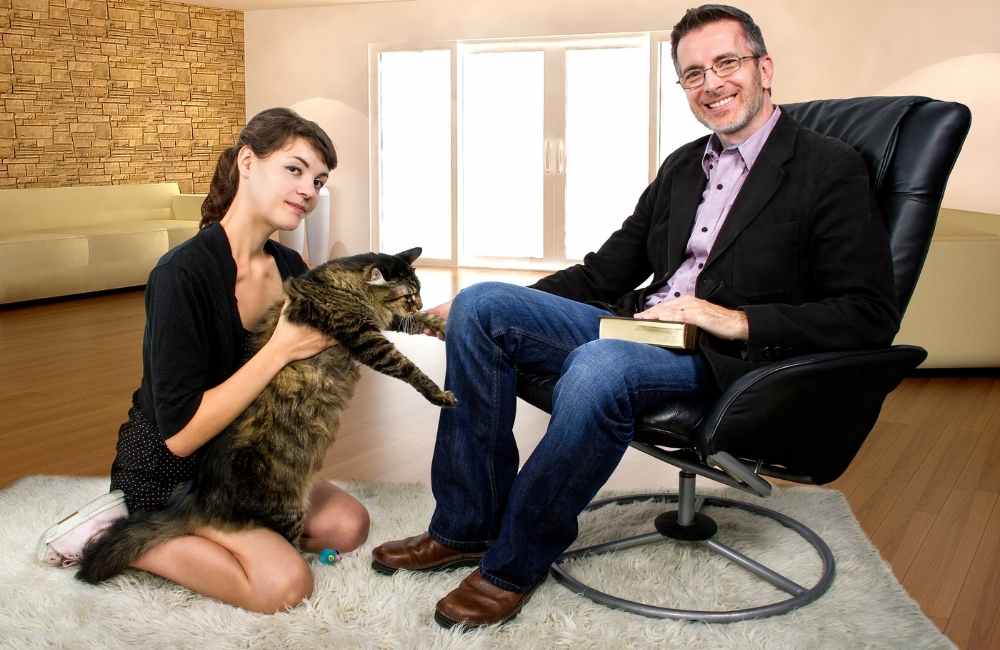Cats make amazing pets for millions of people. Their cute antics and loving natures make them a welcome sight to come home to after a long day, and their companionship is much appreciated.
They’re uniquely connected to us and seem to have a sense for when we’re feeling out of sorts, offering their affection in the form of purring and those oh-so-adorable head butts when we need it most.
However. Cats are an especially finicky species, to be sure. They’re naturally independent and can be territorial, they absolutely abhor change, and sometimes display certain behaviors that not everyone loves.
This is totally understandable — cat ownership isn’t for everyone. If you find yourself saying things like “I hate my cat,” or “I don’t like my cat’s personality” and you’re wondering what you can do about it, read on.
We’ve got some ideas that will help you and your feline friend make amends and rekindle the love you once shared, but first: what are the reasons someone might hate their cat in the first place? There are quite a few — some of which we’ve listed here, along with ways to fix them:
Reasons People Don’t Like Their Cats:
Inappropriate Urination
There’s nothing more vexing than when your cat pees outside the litter box. Cleaning cat urine is something I wouldn’t wish on my worst enemy; it’s that frustrating. Not only is it disgusting and extremely difficult to get clean, but it feels as if your cat has purposely betrayed you!
This is the number one reason people end up hating their cats, and understandably so. After all, who wants to be the person cleaning up urine that stinks to high heaven? While this may be an extreme annoyance and seems like they’re trying to ruin your life, it’s actually your cat’s way of trying to communicate with you.
Cats urinate inappropriately for a variety of reasons, and it’s their way of telling you something’s not right. It could be something as simple as a territorial warning to other cats, or something as serious as a medical condition. Either way, there are things you can do to curb this maddening behavior.
The Fix:
Firstly, take your cat to the vet to rule out any potential medical issues. There are various medical reasons for inappropriate urination, some of which can be life threatening. For example, UTI’s can cause cats to urinate outside their box, and can be dangerous if not treated quickly.
Treatment for any related medical condition will likely stop the problem. If medical causes are ruled out, your cat’s problem might be territorial — or stress related. Cats don’t like other cats encroaching on their turf.
Keep an eye on the behavior and see if there’s anything you can do to deter neighborhood cats from your property. This, along with minimizing stress in their environment — and an effective urine cleaner to prevent further marking — may just resolve the issue.
Scratching
There’s a reason that cat scratchers are such a popular purchase item: cat owners don’t love having their furniture torn to pieces! This is understandable of course, but it’s also in your cat’s nature to scratch things — no matter how annoying it may be to you.
Their scratching, while it may make you want to tear your hair out, actually serves three important purposes: First, it keeps their claws healthy and prevents them from growing too long (sort of like a nail file for us humans). It also helps them work out their emotions, like frustration or anxiety.
Lastly, it gives them a place to leave their scent, in a much more appropriate way than the other option (see above). They’re definitely not trying to destroy your house, though it can surely seem that way when they’re staring right at you as they slice up your couch!
The Fix:
There are many ways to deter Fluffy from scratching where you don’t want her to. The first thing to do is make sure she has plenty of appropriate places to scratch, like scratching posts or cat towers.
This will draw her to the right place, giving her less of a reason to scratch the wrong spots. Bonus tip: sprinkle a little dried catnip on the scratchers to entice her! Other ways to fix this issue include scratch deterrent spray — usually in the form of bitter apple or citrus scent — to keep her away from the places you don’t want her scratching.
Also, clipping her claws shorter (have your vet do this, and we do NOT mean declawing) and making sure she plays enough to release her pent-up energy every day. Scratching can be a sign of boredom, which play helps to minimize.
Natural Independence
Cats are solitary creatures by nature. This doesn’t make sense to humans — we’re social and need connection to feel complete — so it’s understandable that it may bother us. Though it might be hard to believe, our cats love us and see us as family.
However, it’s just not natural for them to want to be with us all the time (like a dog would, for example), which can make us feel like they’re being stand offish. Sometimes it might even seem like your cat doesn’t like you, but that’s not the case at all.
In fact, it’s likely that they’re close enough to keep a watchful eye on you, but just out of sight so as to avoid too much interaction. They’ll come around when they want something — usually food or affection — but they also like having their space.
The Fix:
It may be hard to comprehend since you’re a social human and all — but giving your cat their space is the best solution here. Try to remind yourself that they still love you even when they appear not to be interested.
This will help you accept them for who they are, which is the definition of unconditional love; something our cats have for us and deserve in return. If you simply can’t stand how independent your cat is, try things like playing with him more often, taking a minute to scratch his head when he’s close by, or offering him treats once in a while.
Making the most of the time you do spend together will help you feel better about his independence. Also, cats like quiet, calm environments, so if your house is loud and chaotic, carve out some time for peace and quiet. Kitty will join you when the coast is clear.
Climbing Up on Surfaces
Only cat owners know the frustration of the counter surfing ninja — something most kitties are at one time or another. Cats are expert jumpers and can get up pretty high without blinking an eye, much to our dismay.
Cats love to be up high; it’s something that makes them feel safe. They’re able to see more of their environment and stay out of reach of predators (that pesky dog, for example). It also lets them strategize their best option for escape if the need should arise.
While it’s perfectly understandable to not want dirty little paws on our surfaces, there’s not all that much we can do about it, so we’re told. Or is there? Actually, there might be.
The Fix:
Giving them their own place to be above everyone (how fitting, we know) will allow them a sense of safety, and without your table being littered with paw prints. Try a cat tree or two, some floating shelves, or let them climb up on a surface that you don’t use as much as the others.
Another way to deter them is to keep items on the edges of your surfaces so they can’t see a place to land. This might not be your favorite option, though, and may also backfire. We all know about the cat that somehow squeezes itself into the two spare inches of space that are left, don’t we?
Full disclosure: chances are high that kitty will jump right back up on the counter or table the moment you’re out of sight, so don’t be fooled into thinking you’ve got her totally trained. Hey, at least she respects your wishes when you’re around, right?
Other Odd Behaviors
Some other strange things that your cat does might also be the cause of the tension between you and your feline roommate. These include behaviors like repeatedly going in and out the door, caterwauling (that awful noise that only a cat owner will recognize), and attacking ankles, to name a few.
These are all signs of pent-up energy or boredom in most cases and can usually be stopped by playing with your cat for 20 minutes or so every day. Once they’re getting regular exercise, you’ll find the annoying behaviors are much less frequent and your cat will be much easier to get along with!
It’s easy to forget that cats actually do need attention sometimes, seeing as they’re so independent. But when these problem behaviors arise, it’s usually a sign that they’re asking you to give them a little more of your time, and that will usually resolve most minor issues.
Now that we’ve discussed common issues and their fixes, we’ve got a few more ideas for you to help rekindle the love you once had for your kitty:
What if I Still Don’t Like My Cat’s Personality?
Ways to Repair Your Bond with Your Cat:
Play

Cats need exercise just like we do. When they don’t get enough, the energy comes out in less than desirable ways. They are predatory animals after all, and while they’ve been domesticated to suit our human lifestyles, those instincts are still there.
Giving them something to chase, grab, bite, and scratch will allow them to fulfill their instinctual desire to hunt, helping them release their stored energy and making life easier for the both of you!
Not only is this good for kitty’s overall attitude (which will make it easier for you to love her again), but it’s a great bonding exercise for the two of you to do together. You’ll laugh at her crazy kitty gymnastics, and she’ll have a great time catching her “prey.” Win-win!
Treats

While treats should be used sparingly so as not to make your cat overweight, giving him something that he loves to eat on special occasions will show him how much you care. It can be a little ritual: a few cat treats at the end of the day, or a piece of your roasted chicken on Sundays will do wonders for his overall mood.
It’s been proven that food activates the area of the brain that’s associated with pleasure in cats (and dogs as well, of course), which basically means that feeding him something delicious will make him happy.
You can also use this as a form of training: for example, if your cat isn’t very affectionate, give him a treat or two when he comes to you for a head rub. Not only will he love you for the treats, but you’ll probably notice him coming around more often after a while!
“Catify” Your Home

Many times, when cats appear stand offish, it’s because they’re dissatisfied with their environment. They need to feel like the house belongs to them, too; it gives them a sense of ownership — which equals security.
If your cat is living in a home filled with human furniture and doesn’t have anything that’s just hers, she might be feeling a bit left out! This is easily fixed: place scratching posts around the home or give her a cat tower to hang out on.
You could also go all out and “catify” your house, as Jackson Galaxy recommends on the popular show “My Cat from Hell.” Build a cat superhighway — which is basically a network of shelves for kitty to walk on. This gives her the height advantage she needs and allows her to always be close by, but at the distance she likes — until she’s ready to be affectionate, of course.
Last Resort: Rehome

If all else fails, you’ve tried everything you can, and you’re still not finding yourself liking your cat any more than when you started, you can always rehome him. This is an absolute last resort and should not be taken lightly, but it might be the best option for both of you.
Being stressed out all the time is no way to live; for you or for the cat. Rehoming takes time, though, and it’s important to find the right home where you know he’ll be safe and well cared for.
There are resources for rehoming at local shelters and rescues that will help with any questions you have if you’re seriously considering it, but please try to make it work before you go this route — rehoming is stressful for kitty (and for you) and should only be considered when there are absolutely no other options.


